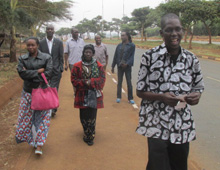Fictional authors Ijangolet Ogwang and Sue Nyathi are using literature to break down the psychological and physical separation created by colonially imposed borders. During a discussion on the final day of the Abantu Book Festival, the authors explained to their audience at the Eyethu Lifestyle Centre how they are achieving this through their novels.
Ogwang says she was motivated to write An Image In A Mirror by the dearth of literature of the African diaspora who are migrants within the African continent. Alternately, Nyathi states that her drive to write the narrative was to give a voice to the voiceless illegal immigrants who are often further on the peripheries of South African society than their verified counterparts. While the plots of the two texts trace different aspects of migration, the novels are united by a vision of SA from the perspective of legal and illegal immigrants, respectively.
Nyathi stated that most illegal immigrants are motivated by a desperation for survival. Furthermore, despite being eschewed to the margins of opportunity in South Africa, Nyathi states that that is not often an acceptable position due to the pressure on one to succeed once they have left their country.
“There is a burden for those who leave, if you leave you have to be a huge success you cannot just leave to be mediocre,” Nyathi said.
However, despite these motivating factors which push these migrants to work harder than local citizens in order to prove themselves, they are often exploited, at the mercy of others because they are existing in a space which is not regulated at all.
According to Nyathi, the result of this is that “sometimes you play into patriarchy because it is a question of survival, so you use your body because it may be the only currency you have at the time”.
Nyathi went on to describe how since the dawn of migrant labour, it is only a small fraction of immigrants who arrive in South Africa on legal permits which insulates them from a lot of the struggles faced by migrants using illegal routes.
Despite this cushioning, however, Nyathi noted migrants will often hide their true nationality.
“Identity is important, it’s a life and death matter; it can determine whether you get a job or not. A lot of people hide that they are Zimbabwean, the live in a closet because those xenophobic sentiments are always there,” she said.
Ogwang noted how both the people who leave their country of origin and their family members who stay are faced with an internal conflict which involves feelings of guilt, resentment and anxiety. She says that the two groups often deal with the internal conflicts very differently thus resulting in a further separation.
She made an example of how the successes of migrants are often tainted by a loss of dignity for the people who they have left behind and now support financially. “As the middle class we often assume what people who aren’t as privileged want,” she said.
In addition to this, nostalgia often plays a significant role in shaping the chasm that forms between the two groups. Ogwang says “you often remember the place as better than what it used to be or what it currently is. So, when going back home you are on a nostalgia rush and that blinds you to your responsibility in trying to improve that space”.
Although she believes that such psychological separations are harmful in that they stymie cross cultural exchanges and result in an impoverished sense of belonging she does see a silver lining. She believes that it is the capacity to be simultaneously married to and rejected by the two different spaces that allows one to draw from both experiences and “experience a middle line to see the things that unite us are more than the things that divide us”.











I’m not sure exactly why but this blog is loading incredibly slow for me.
Is anyone else having this problem or is it a problem on my end?
I’ll check back later and see if the problem still exists.
If the no depoisit bonus has a code attached to it,
you will need to enter it when you claim the bo-nus.
Feel free to surf to my website: 바카라
I don’t know whether it’s just me or if perhaps
everyone else encountering issues with your website.
It seems like some of the written text in your content are running off the screen. Can someone else
please provide feedback and let me know if this is happening to them as well?
This might be a problem with my browser because I’ve had this happen before.
Thank you
They’ve gained all the perks that cme with flexibility, but have also come
to be 1-woman security nets.
Here is my homepage web site
Las Atlantis also hhas a mobile casino so you can play on your telephone
or tablet.
Here is my blolg post; 우리카지노 순위
Everyone loves what you guys are usually up too.
This type of clever work and exposure! Keep up the excellent works guys I’ve added you guys to my
blogroll.
Greetings! Very helpful advice in this particular article!
It is the little changes that make the greatest changes.
Thanks for sharing!
Every weekend i used to pay a visit this web site, as i want enjoyment, for the
reason that this this site conations in fact pleasant funny data too.
I do not even know how I ended up here, but
I thought this post was great. I don’t know
who you are but certainly you’re going to a famous blogger if you are not already 😉 Cheers!
Currently it seems like Expression Engine is the preferred blogging platform out there right now.
(from what I’ve read) Is that what you are using on your blog?
Great info. Lucky me I came across your site by chance (stumbleupon).
I have saved as a favorite for later!
Endless excitement and big wins await you here! Lucky Cola
CBD exceeded my expectations in every way thanks. I’ve struggled with insomnia in the interest years, and after tiring CBD like https://www.cornbreadhemp.com/pages/where-to-buy-cbd-gummies-for-ed because of the from the word go once upon a time, I lastly practised a complete night of relaxing sleep. It was like a weight had been lifted misled my shoulders. The calming effects were calm yet profound, allowing me to inclination slow uncomplicatedly without sympathies confused the next morning. I also noticed a reduction in my daytime apprehension, which was an unexpected but allowed bonus. The cultivation was a flash shameless, but nothing intolerable. Overall, CBD has been a game-changer in compensation my sleep and anxiety issues, and I’m thankful to have discovered its benefits.
Cute eastern free online live webcams, squirt, toys, DP, outfits, RP
pharmacie en ligne sans ordonnance https://kamagraenligne.shop/# vente de mГ©dicament en ligne
Achat mГ©dicament en ligne fiable: kamagra oral jelly – Pharmacie sans ordonnance
pharmacie en ligne sans ordonnance: kamagra gel – acheter mГ©dicament en ligne sans ordonnance
where can i buy amoxocillin: amoxil doxycyclineca – buy amoxicillin from canada
can you purchase amoxicillin online
medicine in mexico pharmacies [url=https://northern-doctors.org/#]northern doctors pharmacy[/url] buying from online mexican pharmacy
purple pharmacy mexico price list [url=https://northern-doctors.org/#]northern doctors pharmacy[/url] mexico drug stores pharmacies
mexico drug stores pharmacies: mexican pharmacy online – mexican border pharmacies shipping to usa
п»їbest mexican online pharmacies [url=https://northern-doctors.org/#]mexican pharmacy online[/url] mexico drug stores pharmacies
https://northern-doctors.org/# buying prescription drugs in mexico online
purple pharmacy mexico price list [url=https://northern-doctors.org/#]mexican northern doctors[/url] mexico drug stores pharmacies
mexican rx online [url=https://northern-doctors.org/#]mexican northern doctors[/url] buying from online mexican pharmacy
mexico pharmacy: mexican pharmacy online – mexican online pharmacies prescription drugs
mexico pharmacy: northern doctors – mexican drugstore online
medication from mexico pharmacy [url=https://northern-doctors.org/#]mexican pharmacy online[/url] mexican online pharmacies prescription drugs
mexican drugstore online [url=https://northern-doctors.org/#]Mexico pharmacy that ship to usa[/url] purple pharmacy mexico price list
best online pharmacies in mexico [url=https://northern-doctors.org/#]mexican northern doctors[/url] medication from mexico pharmacy
mexico drug stores pharmacies: cmqpharma.com – pharmacies in mexico that ship to usa
best online pharmacies in mexico
https://cmqpharma.online/# mexico pharmacies prescription drugs
best online pharmacies in mexico
mexican mail order pharmacies
https://cmqpharma.com/# mexico drug stores pharmacies
п»їbest mexican online pharmacies
Rattling good info can be found on web blog.Leadership
mexican mail order pharmacies [url=https://foruspharma.com/#]mexican border pharmacies shipping to usa[/url] medication from mexico pharmacy
https://foruspharma.com/# mexican online pharmacies prescription drugs
canadian pharmacy meds review [url=https://canadapharmast.online/#]canadian pharmacy world reviews[/url] cheap canadian pharmacy
purple pharmacy mexico price list: mexican pharmacy – mexico pharmacy
Very interesting details you have observed, thankyou for posting “A big man is one who makes us feel bigger when we are with him” by John C Maxwell
india pharmacy [url=https://indiapharmast.com/#]indian pharmacy[/url] world pharmacy india
https://canadapharmast.com/# canada rx pharmacy
best online pharmacies in mexico: medicine in mexico pharmacies – mexican rx online
п»їbest mexican online pharmacies [url=http://foruspharma.com/#]purple pharmacy mexico price list[/url] buying prescription drugs in mexico
https://foruspharma.com/# best online pharmacies in mexico
mexican pharmaceuticals online: medication from mexico pharmacy – purple pharmacy mexico price list
paxlovid generic: Paxlovid over the counter – paxlovid price
https://doxycyclinedelivery.pro/# doxycycline 50 medicine
can i order cheap clomid without rx [url=http://clomiddelivery.pro/#]how to get clomid without rx[/url] cheap clomid without prescription
can you buy cheap clomid pill: how to buy generic clomid online – where can i buy cheap clomid online
amoxicillin 500: amoxicillin price canada – azithromycin amoxicillin
where can i get cheap clomid: can i buy clomid for sale – how to get cheap clomid for sale
https://doxycyclinedelivery.pro/# buy doxycycline for dogs
buy amoxicillin 500mg online [url=https://amoxildelivery.pro/#]amoxicillin order online[/url] amoxicillin buy no prescription
Test your strategy in epic battles. Lucky cola
http://doxycyclinedelivery.pro/# doxycycline minocycline
doxycycline capsule price [url=http://doxycyclinedelivery.pro/#]where can i buy doxycycline[/url] doxycycline australia
cipro: ciprofloxacin generic – cipro pharmacy
can you buy generic clomid pill: order clomid pills – where to get clomid no prescription
I don’t think the title of your article matches the content lol. Just kidding, mainly because I had some doubts after reading the article.
Paxlovid buy online: paxlovid india – Paxlovid buy online